Today’s article is not just based on random reasoning, but when I decided to come to Tibet I estimated that the language barrier would be a great impediment to communication and, yet, spending four weeks constantly communicating with the local inhabitants but without being able to speak with no one it has opened many other paths and digressions for me. I admit to experiencing the most accurate smiles and connecting in a deep place with each person I meet, something that has made me wonder what the world would be like if languages did not exist.
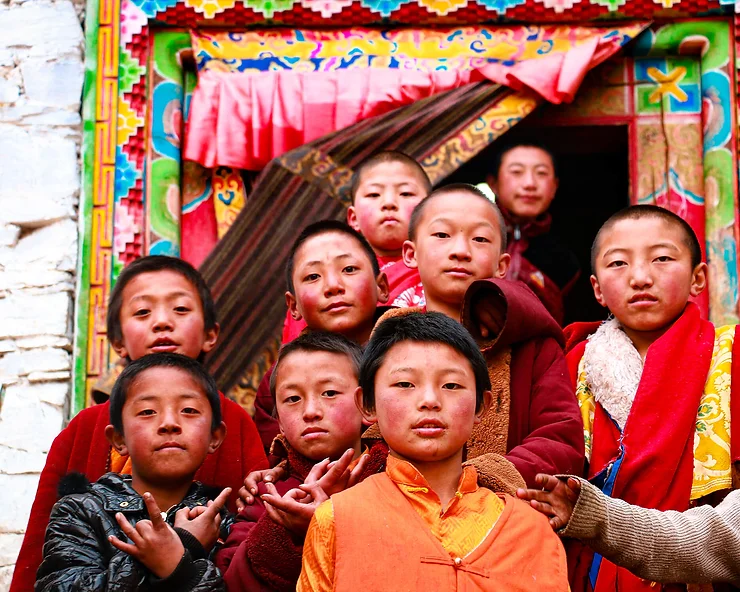

Los niños tienen una gran capacidad comunicación no verbal
It would be a society in which there would be no place for dialectical manipulation and consequently there would be no politics or religion beyond that dictated by one’s own reason. Therefore, we would learn to judge and value those around us for their actions and purposes, the facts do not deceive and the consideration and reputation of each individual would be neither more nor less than deserved.
It would also have an impact on art, because if we imagine a world where songs do not have lyrics, I am convinced that we would be able to create, perceive and feel music in a more profound way. Just as there would be no artistic marketing that tries to sell us and convince us about what the works transmit, so speculation would be eliminated and art would be judged entirely by the emotions it is capable of producing in the audience.
And in love? There would be no courtship of verbiage, but rather that of facts, expression, feeling. Telltale looks and gestures would take more prominence, as would the ability to read and interpret them.
During these four weeks of travel in Tibet I have not been able to talk to anyone, but I have discovered a language of body expression that replaces words and is capable of accurately transmitting essential feelings such as courtesy, gratitude, esteem or respect. I respect. I have witnessed time and again how an honest gesture is worth a thousand words and, although it may sound strange, sometimes after leaving a place I have had the intense feeling that I truly knew some Tibetans whom I already, without a doubt, considered. my friends.
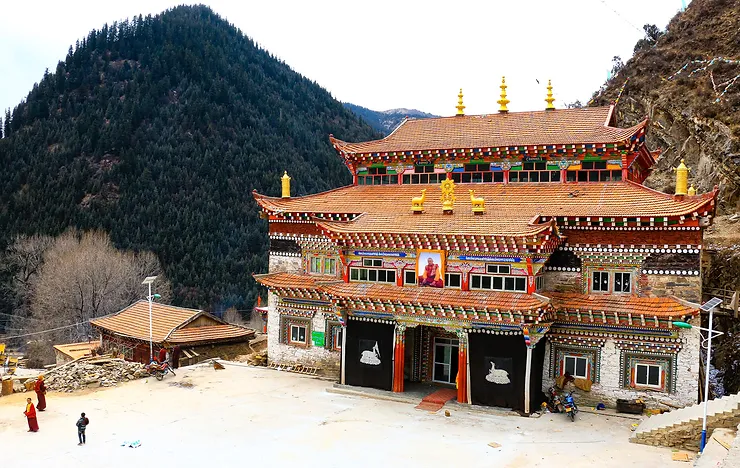

Tibetan temple on the mountain, school for young Buddhist monks
During the first week of the trip, I arrived with my camera and backpack at a monastery between mountains inhabited by 130 teenage monks tutored by a dozen senior lamas. The moment I arrived I found myself surrounded by a large number of boys who, motivated by their curiosity, asked me questions in Tibetan incessantly. It was a situation in which there were many things to say and share, but the language barrier seemed to prevent it. Almost certainly, it was the first time they had seen a Westerner and frustration was beginning to show on his face at not being able to communicate with me.
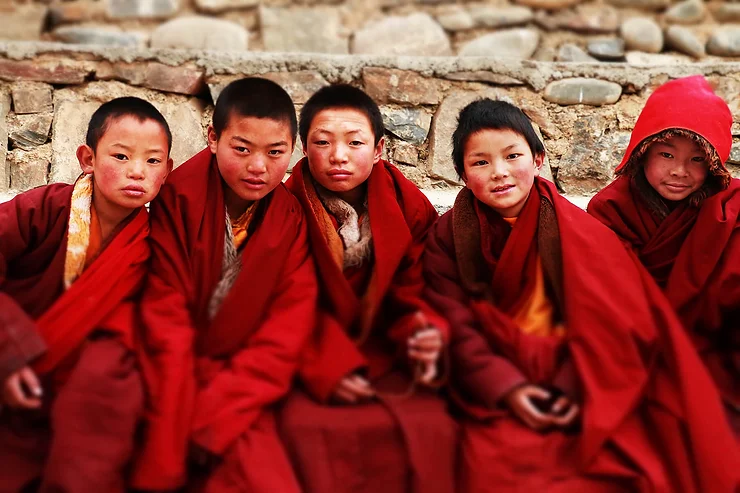

Not speaking the same language did not pose any barrier to them.
So, I decided it was time to take action, I took out my harmonica and started playing and dancing. The response was unforgettable, as the young monks who were still watching from a distance also approached and all together began to laugh, shout and applaud arrhythmically. Next, a boy showed me a textbook where images of different animals appeared, I read his intention and began to interpret their sounds to the general annoyance of the boys, after which some of them began to make their own version of onomatopoeias, something that helped us discover that animals that made exactly the same sounds were interpreted completely differently by them and by me. The young monks offered me room and board and I ended up living with them for three days, during which, despite not speaking the same language, we did not stop communicating for a moment. One morning, three of them even woke me up to invite me for a walk, in what ended up being a six-hour climb up the mountain that bordered the monastery in a snowstorm.
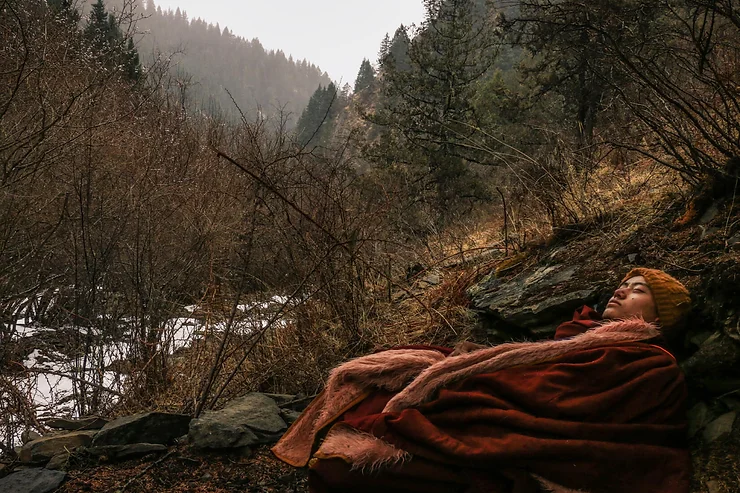

Young Tibetan monk resting in the forest
I will never forget the moment I had to leave that place, because a dozen of the teenage monks with whom I fraternized the most gathered to say goodbye. One of them approached and, touching his heart with one hand, extended the other to give me the necklace that until that moment was hanging from his neck. If he had said ‘goodbye’ or ‘thank you’ they would not have understood me, but those words were not necessary nor would they have done justice to what I truly felt at that moment. Instead, before I left, the boys and I connected through our gazes, in the eyes both my infinite gratitude and their extreme satisfaction for the adventure of human and cultural immersion that we had just shared were expressed. Without further ado, I left without saying or hearing anything, but the necklace that now hung around my neck and the looks he gave me as a reminder were one of the most intense messages I have ever experienced.
Obviously I have highlighted only the positive facets that come from this digression, since without a doubt life would lose its charm without being able to recite poetry, listen to an opera or say I love you. In short, if languages did not exist, we would boost our bodily expressiveness and human interaction to be able to transmit what we feel. We’d probably talk less, but I get the impression we’d probably say a lot more.
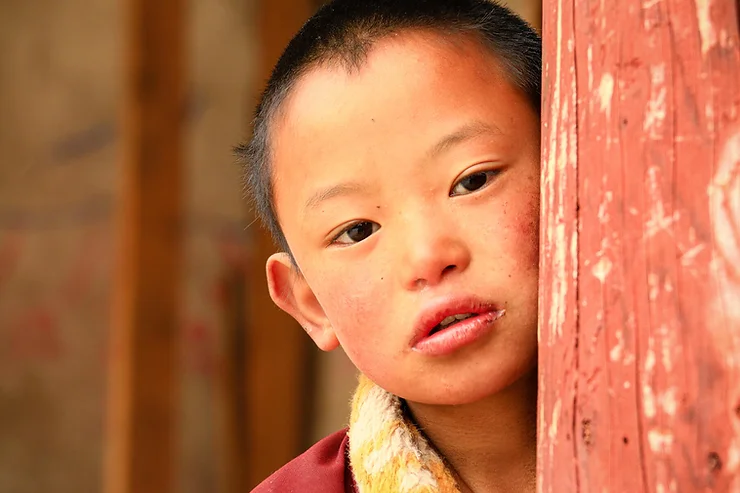

If languages did not exist we would speak less, but we would probably say a lot more
